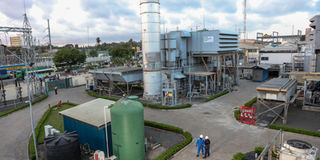Prime
What’s at stake as Songas power deal expires

The Songas power station in Ubungo, Dar es Salaam. The Power Purchase Agreement (PPA) between Tanzania Electric Supply Company (Tanesco) and Songas officially expired on Thursday. PHOTO | FILE
What you need to know:
- This sets the stage for Songas to start claiming about $90 million (about Sh250 billion) from Tanesco in outstanding payments should there be no further extension of the agreement
Dar es Salaam. It is now official. The Power Purchase Agreement (PPA) between Tanzania Electric Supply Company (Tanesco) and Songas officially expired on Thursday.
This puts Songas on the path to start claiming about $90 million (about Sh250 billion) from Tanesco in outstanding payments should there be no agreement on a further PPA extension, The Citizen understands.
Both Deputy Prime Minister and Energy minister Doto Biteko and Energy permanent secretary Felchesmi Mramba on Thursday confirmed the expiry of the agreement.
“It has indeed expired. Unfortunately, I’m currently in a meeting, so I cannot divulge more details,” Dr Biteko said.
Asked what will follow after the expiry of the PPA, Mr Mramba said: “I can’t say anything since the contract expires today (Thursday) and we haven’t made any plans.”
Unless stated otherwise, the expiry of the PPA means that Songas could start processing the decommissioning of its Ubungo power plant and distributing any salvage value among its shareholders.
This is so because the deal is under a build-own-operate arrangement, meaning that Songas will retain ownership of the assets following the expiry of its agreement with Tanesco.
Currently, the government – through Tanesco, Tanzania Petroleum Development Corporation (TPDC) and Tanzania Development Finance Company Limited (TDFL) – holds a 46 percent stake in Songas, with Globeleq owning the rest.
Outstanding payments Songas will claim from Tanesco have increased from the amount that was calculated by the Controller and Auditor General (CAG) last year.
In his audit report for 2022/23, the CAG, Mr Charles Kichere, warned against delaying the settlement of three disputes between Songas and Tanesco, which owed the power producer Sh109.07 billion at that time.
The CAG’s review revealed persistent disputes that have remained unresolved since 2022.
Mr Kichere said Tanesco disputed a payment amounting to Sh67.94 billion. However, Songas had continued to include sinking charges in monthly invoices from August 2022 to June 2023 amounting to Sh29.34 billion despite a dispute notice issued by Tanesco in December 2022.
“Additionally, an invoice dated January 4, 2023, amounting to Sh23.94 billion and $4.02 million for December 2022, raised a dispute related to Sh11.78 billion in outstanding value added tax (VAT) liability owed to TRA due to lack of supporting documents,” the CAG said last year.
In May, this year, Energy deputy minister Judith Kapinga told Parliament that the government would consider national interests before granting a licence extension between Tanesco and Songas.
She said the Government Negotiation Team was formed in April 2023 and that negotiations were expected to be completed before the contract expires.
Although the government has substantially increased its electricity generation capacity by about 662 megawatts following the switching on of the three out of nine turbines at the Julius Nyerere Hydropower Plant (JNHPP), the importance of alternative electricity sources cannot be overemphasised.
Producing electricity from natural gas offers the national grid its much-needed boost during times of drought.
Insiders say at 4.9 US Cents per kilowatt hour, Songas has been selling electricity to Tanesco at one of the cheapest rates. In its proposal for a six-year PPA extension, the company reduced it further to 3.9 US cents per kilowatt hour, excluding natural gas costs.
When the expected negotiated gas costs are included, the tariff would be 6.82 US cents per kilowatt hour. This, people privy to the issue say, was still lower than 11 US cents per kilowatt hour that Tanesco charges its clients.
On the contrary, analysis shows that Tanesco will have to pay about 8 US cents per kilowatt hour if it imports hydro-generated electricity from Uganda and Zambia while the anticipated imports from Ethiopia, including its wheeling charges, would cost an estimated 7.78 US cents per kilowatt hour.
The tariff of 3.0 cents per kilowatt hour as recommended by the government, insiders say, would not be attractive to the company’s international investors who would not agree to invest in an extended PPA and refurbish the plants as required.
Since 2012, Songas has paid a total of Sh180 billion to the government.
Songas successfully completed the pipeline construction in May 2004, and commercial operations commenced in July 2004 with a 20-year contract in place.
The 20-year PPA was thus required to end in July 2024, but was extended for three months, which expired on Thursday.
Additional reporting by Rosemary Mirondo





